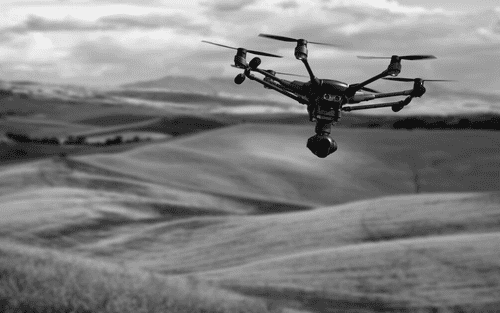Introduction & Drone Uses
Drones, sometimes known as unmanned aerial vehicles (UAVs) or unmanned aerial systems (UASs), are now commonplace in society. They are used by farmers, government agencies, and hobbyists alike. Some common uses for drones include farming applications, law enforcement searches, and search and rescue missions. However, as with any technology, there is an ever-changing legal landscape to keep up with technological advancements. This lag often leads to confusion and issues regarding both our privacy and our rights.
North Dakota’s Current Drone Law
North Dakota recently introduced Chapter 29-29.4 to the North Dakota Century Code, titled “Surveillance by Unmanned Aerial Vehicles.” This chapter focuses on law enforcement’s use of drones for surveillance and adds important limitations to law enforcement’s use of drones to protect public privacy. The law requires that law enforcement agencies need to generally obtain a warrant before utilizing a drone for a search. The first major case happened here in North Dakota, to apprehend a cow thief who was located utilizing a Predator drone from Customs and Border Patrol (CBP).
North Dakota also has enacted North Dakota Administrative Code 30-04-02-22. The code regulates the use of drones in Game or Fish Management Areas. The administrative code prohibits operating a drone on any state wildlife management area unless given permission by the Game and Fish director or their designee.
As of writing this article, North Dakota has not enacted any other known regulations including registration or certifications to operate drones.
Federal Drone Regulations
Drones are also subject to Federal Regulations. Two common federal drone regulations that are often overlooked are registration and certification requirements. The FAA holds commercial pilots, government pilots, and hobby pilots to different certification standards to operate a drone. Commercial pilots must pass the FAA’s Aeronautical Knowledge Test which covers the FAA Part 107. Government pilots (including law enforcement and public safety departments) can choose to either fly under the same FAA Part 107 certification or to obtain a federal Certificate of Authorization. Hobby pilots who solely utilize drones for recreational purposes must also pass an aeronautical knowledge and safety test such as the TRUST Test.
The FAA also requires that drones weighing more than 0.55 pounds (250 grams) and less than 55 pounds (25 kilograms) be registered with the FAA. The weight includes any payload on board, such as cameras or packages/parcels. Registration can be completed on the FAA’s “DroneZone” webpage. Any drone that weighs more than 55 pounds must be registered as an aircraft for which separate registration and certifications apply.
Conclusion
Overall, navigating the constantly evolving landscape of drones and airspace law can be a stressful and complicated process. Our team at SW&L Attorneys can help guide you through the process. To get in touch with our team, call 701-297-2890 or email us at: info@swlattorneys.com.
This article is for informational purposes only and is subject to our disclaimer.










